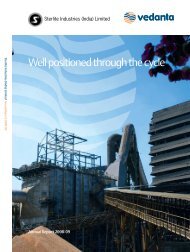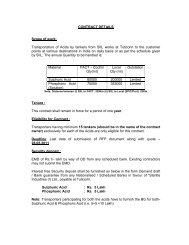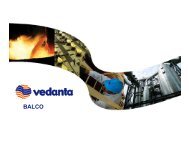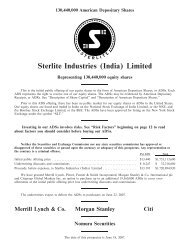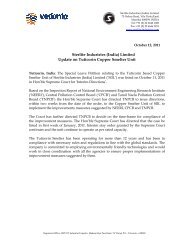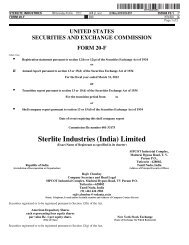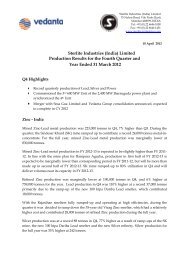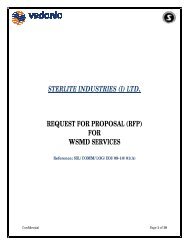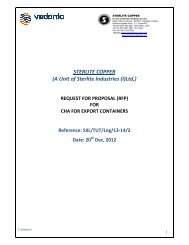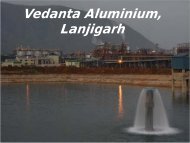Sterlite Industries (India) Limited - Sterlite Industries India Ltd.
Sterlite Industries (India) Limited - Sterlite Industries India Ltd.
Sterlite Industries (India) Limited - Sterlite Industries India Ltd.
Create successful ePaper yourself
Turn your PDF publications into a flip-book with our unique Google optimized e-Paper software.
Water (Prevention and Control of Pollution) Act, 1974 (“Water Act”)<br />
The Water Act aims to prevent and control water pollution as well as restore water quality by establishing and empowering State Pollution<br />
Control Boards. Under the Water Act, any individual, industry or institution discharging industrial or domestic waste water must obtain the<br />
consent of the relevant State Pollution Control Board, which is empowered to establish standards and conditions that are required to be<br />
complied with. If the required standards and conditions are not complied with, the State Pollution Control Board may serve a notice on the<br />
concerned person, cause the local Magistrates to pass an injunction to restrain the activities of such person and impose fines.<br />
Water (Prevention and Control of Pollution) Cess Act, 1977 (“Water Cess Act”)<br />
Under the Water Cess Act, a lessee engaged in mining is required to pay a surcharge calculated based on the amount of water consumed and<br />
the purpose for which the water is used. A rebate of up to 25% on the surcharge payable is available to those industries which install any plant<br />
for the treatment of sewage or trade effluent, provided that they consume water within the quantity prescribed for that category of industries<br />
and also comply with the effluent standards prescribed under the Water Act or the EPA. Penalties for non compliance include imprisonment of<br />
any person in contravention of the provisions of the Water Cess Act for a period up to six months or a fine of Rs. 1,000, or both.<br />
Air (Prevention and Control of Pollution) Act, 1981 (“Air Act”)<br />
Pursuant to the provisions of the Air Act, any individual, industry or institution responsible for emitting smoke or gases by way of use of<br />
fuel or chemical reactions must obtain the consent of the relevant State Pollution Control Board prior to commencing any mining or<br />
manufacturing activity. The State Pollution Control Board is required to grant consent within a period of four months of receipt of an<br />
application, but may impose conditions relating to pollution control equipment to be installed at the facilities and the quantity of emissions<br />
permitted. The penalties for the failure to comply with the provisions of the Air Act include imprisonment of up to seven years and the payment<br />
of a fine as may be deemed appropriate.<br />
Employment and Labor Laws<br />
We are subject to various labor, health and safety laws which govern the terms of employment of the our laborers at our mining and<br />
manufacturing facilities, their working conditions, the benefits available to them and the general relationship between our management and<br />
such laborers. These include:<br />
The Industrial Disputes Act, 1947 (“IDA”)<br />
The IDA seeks to preempt industrial tensions in an establishment and, provide the mechanics of dispute resolution, collective bargaining<br />
and the investigation and settlement of industrial disputes between unions and companies. While the IDA provides for the voluntary reference<br />
of industrial disputes to arbitration, it also empowers the appropriate government agency to refer industrial disputes for compulsory<br />
adjudication and prohibit strikes and lock-outs during the pendency of conciliation proceedings before a board of conciliation or adjudication<br />
proceedings before a labor court.<br />
Contract Labor (Regulation and Abolition) Act, 1970 (“CLRA”)<br />
The CLRA has been enacted to regulate the employment of contract labor. The CLRA applies to every establishment in which 20 or more<br />
workmen are employed or were employed on any day of the preceding 12 months as contract labor. The CLRA vests the responsibility on the<br />
principal employer of an establishment to register as an establishment that engages contract labor. Likewise, every contractor to whom the<br />
CLRA applies must obtain a license and may not undertake or execute any work through contract laborers except in accordance with the<br />
license issued.<br />
To ensure the welfare and health of contract labor, the CLRA imposes certain obligations on the contractor in relation to establishment of<br />
canteens, rest rooms, drinking water, washing facilities, first aid and other facilities and payment of wages. However, in the event the<br />
contractor fails to provide these amenities, the principal employer is under an obligation to provide these facilities within a prescribed time<br />
period.<br />
62



